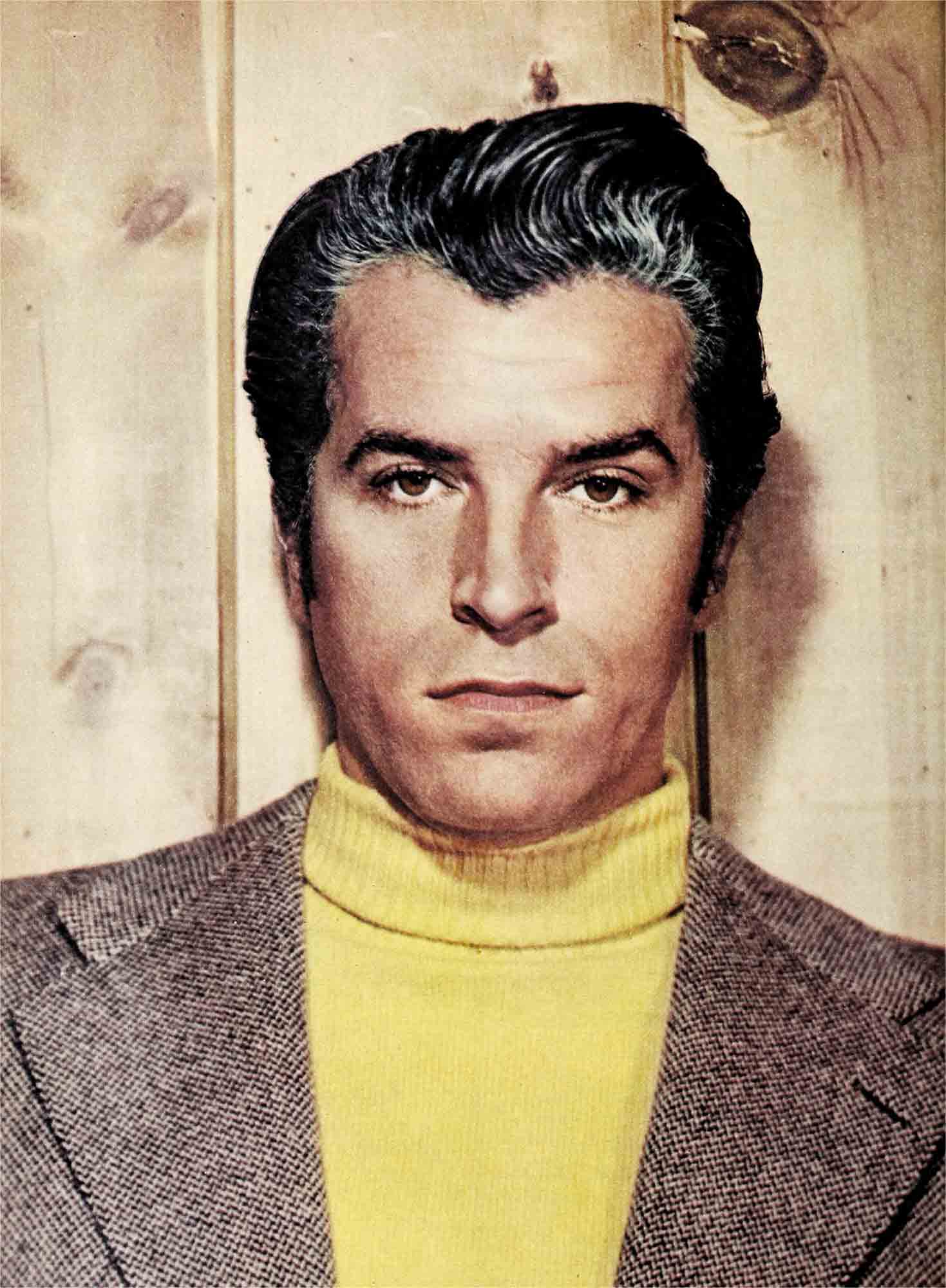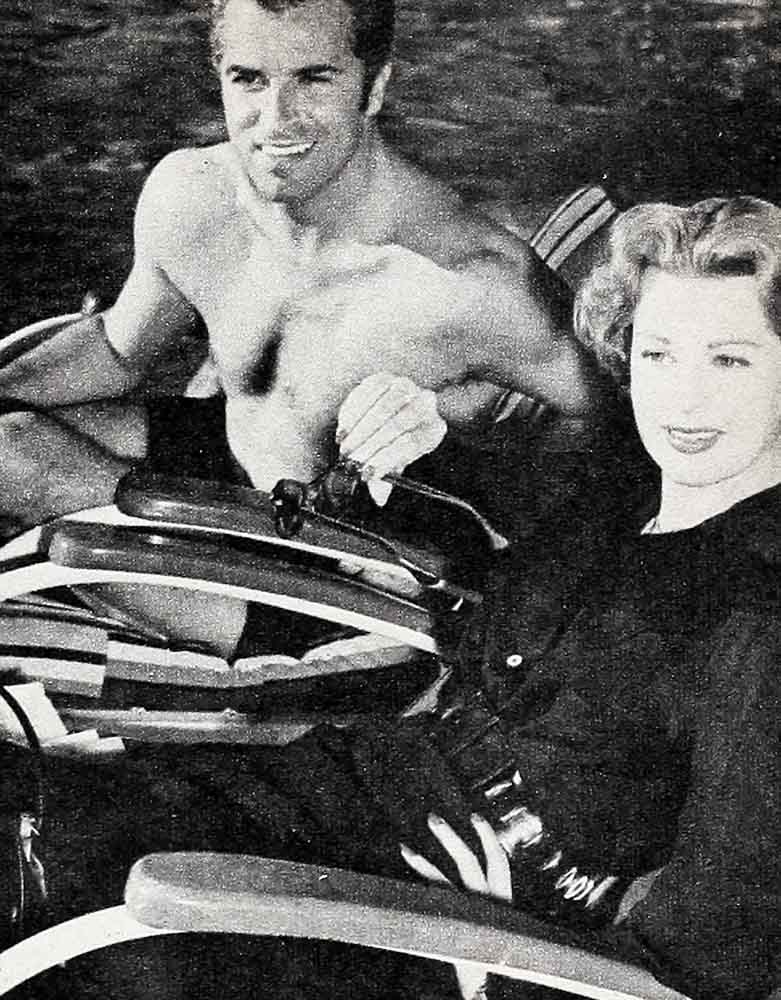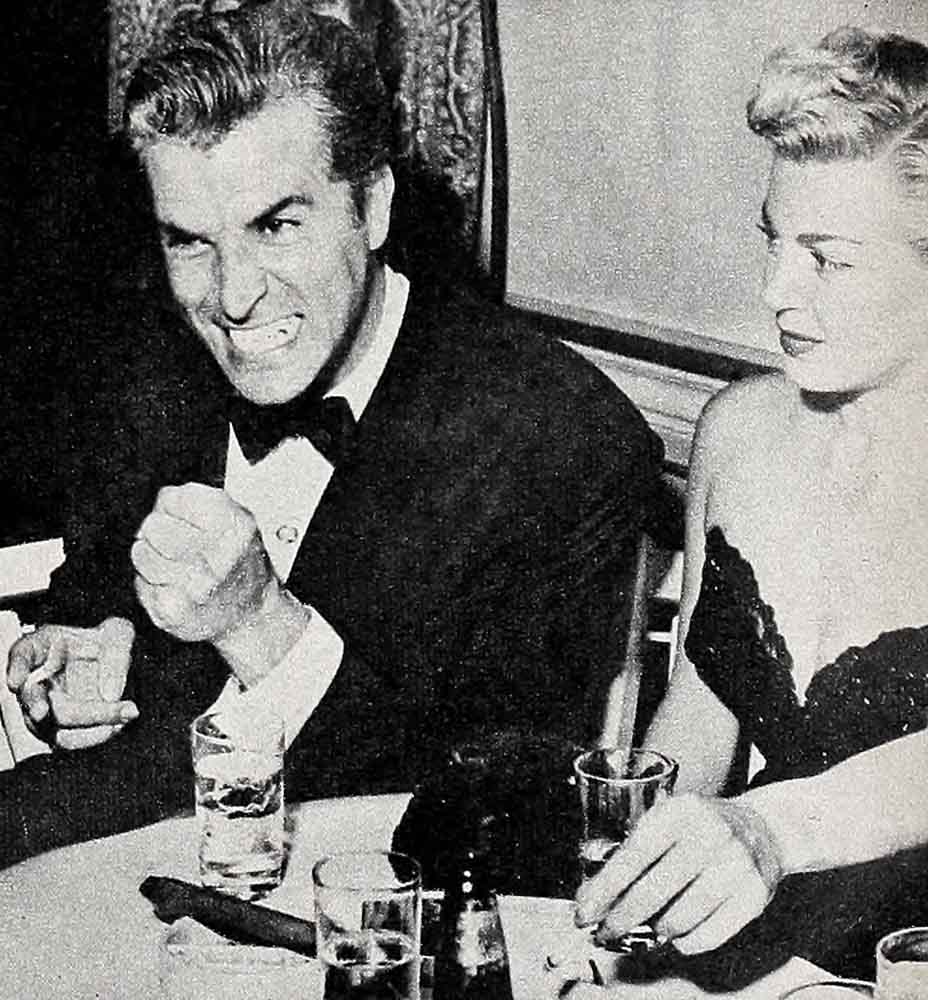Fernando Lamas—Hero Or Heel?
“Women,” says Fernando Lamas, “are the greatest assets in the world.” And the record shows that Fernando Lamas’ assets have never been frozen. For Fernando, like a cool- headed Wall Street investor, seems always to operate with his head and not his heart.
The handsome caballero from the Argentine, has been accused repeatedly of using women to further his film-acting career. It is the aim of this story to weigh the evidence and to arrive at the verdict: Is Fernando Lamas really guilty of cold-bloodedly using women in general, and two beautiful movie stars in particular, to break his way into the Hollywood stratosphere?
AUDIO BOOK
A prosecuting attorney would remind the jury of these facts: Fernando was happily married when he left Buenos Aires for Hollywood three and a half years ago. Then suddenly came the announcement of a separation from his wife, Lydia. By an ironic coincidence, the studio announced at just about the same time that the actor, then comparatively unknown in this country, would co-star with Lana Turner in “The Merry Widow.” Then Lana startled Hollywood by letting Lamas get away with most of the close-ups in the picture. She had a good feminine reason; she was in love with him. The studio announced that they would star together again in “Latin Lovers,” and Lana announced to her palpitating friends that just as soon as she divorced Bob Topping and Fernando got his freedom, she would marry her leading man.

But Lamas wasn’t quite ready to discuss marriage, it seems. This attitude led to an understandable tension between the lovers. And the tension flared into a public fight at the Marion Davies wingding for Johnnie Ray. For weeks afterwards, columnists berated Fernando and quoted him as making such remarks as “A man in this town has to put his career first.” He made it clear that he had no intention of getting hitched to the girl he had courted so assiduously, or even of thinking about it until she went to Las Vegas to get a divorce. When that time came, he didn’t even bother to go up there to help her while the waiting away. Lana and her friends called him a heel.
Came a new dawn and Bingo! Fernando was at it again. His publicity, which had lain dormant for a week or so, flared to a bright glow once more in the company of beautiful redhead Arlene Dahl. She had just kicked Lex Barker out of her connubial bed, and Lex, meanwhile, had latched on to the lonely and lovely Lana. Once again it was the distaff section of the Lamas combination who was rapturous. Arlene told everyone who would listen, “I love him He’s wonderful.”
So Hollywood waited this past fall until October 15th, when Arlene’s divorce from Lex Barker would be final to see what would happen. Nothing did. There’s a possibility that something may have, by the time you read this story. But, as of going to press, there was a coolness in the air that had nothing to do with the weather. And again there was talk that Fernando was merely repeating himself—using the name of a prominent movie actress to keep himself warm in the public prints.
I’ve seen quite a lot of Mr. Lamas in the past five years, and even though, by North American standards he does sound rather conceited, I personally have never found him ungallant about the fair sex, or dishonest in his replies. He’s very frank—sometimes embarrassingly so. Like the time he told a reporter, “Arlene’s so beautiful and warm—if you know what buttons to push.” Can you imagine any man you know saying that?
When I spoke with Fernando, we discussed love—naturally. “It’s all a question of timing,” said Fernando with the positive air of a man who knows his subject thoroughly. “How can you walk into a house,” he put it, “unless someone opens the door for you?” As I say, he sounds a little boastful by our standards.

But Arlene admits freely that, to use Fernando’s phrase, she couldn’t wait to open the door. So how could he be using her when she wanted to be used so badly? And wasn’t Lana Turner jumping into Fernando’s arms on the rebound after her break-up with Bob Topping? Maybe at first she was using Fernando to get back at Bob. But only at first—because Fernando has a way with women, a very fascinating way. Arlene, who certainly should know, says, “Any woman who has ever loved Fernando can never get over him. And that includes his wife.”
When Fernando was in New York with Arlene not so long ago, someone asked him if he was having a good time in the big city. He said he was, but this slipped out: “I can’t wait to get back to California to see my wife and child.” Now what exactly did he mean by that?
“Nothing,” Fernando assured me afterwards. “There isn’t a chance of my going back to my wife. But we are friends and I go to her house all the time to see our daughter. I love my child more than anyone or anything in the world.” Arlene obviously knows this too, but it doesn’t seem to cool her ardor. Fernando told me that, just before she took off for New York to play Roxanne in “Cyrano de Bergerac,” she said to him, “I just don’t think I can go through with it, unless you are right there in the front row where I can see you.” But as he told me the story, I got the impression that, even if he did attend the premiere (which he did), his wouldn’t be the excited dash of a man racing to be with the woman he adores.
Of course, you must take into account the fact that Fernando is a very practical man. Now most people believe that Arlene is so practical that she’s a walking adding machine. But believe me, she hasn’t done any adding or subtracting in her mad love for Mr. Lamas. In this case, it’s the hot Latin with the cold head who is weighing everything carefully. When I said to him, “I think Arlene would make you a great wife,” he replied, “Yes, I think it would work out for me with Arlene. But why,” he wanted to know, “why all this rush? In any other place but Hollywood you can go out for months and months with a girl and no one keeps asking ‘When are you going to marry?’ Everywhere else, they take their time. (This, after he and Arlene had been dating for a solid year.) “But don’t think we’re losing time,” he continued very seriously. “If you give yourself time, your , chances for success are better. She’s done wonderful things for me. And,” he admitted without somehow sounding smug, “I’ve done wonderful things for her.”
As he talked, I remembered a conversation I’d had with Arlene a few weeks before she picked up her final divorce papers. “If I were free now, we’d marry. Fernando is the only man I’ve ever loved.” Pretty warm for a reputedly :old Nordic from Norway. “But,” she added, “I’m superstitious, and if we set the date now, we might be jinxed.” I wondered then if she I weren’t preparing a future cushion for a wounded heart.

“Arlene is basic,” Fernando told me. “You know what I mean, the head on the shoulders. A lot of people say she’s so business-minded. She is. But for the man she loves, she’d give up everything, even her career.” The question is, how much would Fernando give up for the woman he loves? And is it possible for him to be one hundred per cent in love? He’s so sensible, it’s hard to say. For instance, what makes more sense than this speech from Fernando: “Even two big stars (and he was referring to himself and Arlene) can work things out, when they are human beings first.” Is his hesitancy about taking the marriage plunge caused by doubt as to whether Arlene is a human being first and a star second? Or is it just that he isn’t sure he is in love with her? I’ve heard him say, “She’s a wonderful girl.” But I’ve yet to hear him say, “I’m in love with her.”
And yet they talk of going to Norway where Arlene wants to show off her prize to her army of relatives. And he told me, “We’ve talked of going to the Argentine. There’d be riots. They’d kill her. They love blondes, but redheads even more.” You can see they are proud of each other. And they most certainly have great respect for each other.
Fernando flatly denies ever using women to further his career. “How about Lana Turner?” I asked. “When people implied I was using her to promote my career, it hurt me very much,” Fernando says. “It gave me a stomach ache. What hurt—and even scared me—was not the people who said those things. I knew they didn’t like me. But I was afraid of what the public, which didn’t know me, would think of me. We have to live on what they think. But the public has a sixth sense, thank goodness.
“Actually I was a star before I met Miss Turner. I was one of five stars in my first picture here, ‘Rich, Young and Pretty.’ And I starred in my second picture. And I didn’t even meet Miss Turner until we were introduced on the set of ‘The Merry Widow.’ And my role was not changed after meeting her.” But the fact remains that Lana allowed him to appear to such advantage in ‘The Merry Widow” that afterwards Metro tore up his contract and tripled his salary.
When he broke up with Lana and she insisted on another actor, Ricardo Montalban, for “Latin Lovers,” Fernando merely shrugged his shoulders, although the part had been written for him. Ricardo happens to be one of his best friends and boosters. And besides, by that time, he was already snug as a bug in a rug, playing opposite Arlene in “Sangaree.” Immediately afterwards, he and Arlene were rushed into “The Diamond Queen.” And unless something goes seriously wrong between them, they will soon be on their way to Spain to co-star in “A Matter of Life or Death,” for Hugo Fregonese. Arlene will play a Spanish girl, and there’s a problem with her hair. “But to do this picture, Arlene doesn’t give a darn if she has to dye her hair blue,” says the confident Fernando.
“Does it help your performance,” I asked him “to be in love with your leading lady?” “It’s logical,” said the logical Latin, “that when you’re close to an actress, you give a better romantic performance. But I don’t want to be typed as a Latin lover with wavy hair and three rows of teeth. Once in a while I want to play a dramatic role that has nothing to do with a woman.”
It’s a fact, and something I hope Arlene understands, that women in many countries—especially countries south of the border—are regarded as something inferior to men. And this could account for the undertone of coldness in Fernando’s attitude towards the fair sex. He likes women. I suppose he even loves them in his fashion. But with him, first things come first, and women are not first.
Take the ranch he is planning to buy in the Valley and the apartment house he’s buying in town. “I want an apartment house in case I don’t continue in the movie business. The whole thing’s like a balloon of gas—it goes up and up, and you don’t know when it’ll come down and explode. The ranch, I want to live on. The house will be small with some land, a swimming pool and some horses. I love cars and horses. (This is the first time, except in talking about his child, that he used the word “love.”) I broke nearly every bone in my body riding horses. But I love to ride What else is life except these few things you love and the people you like?”
“How about Arlene and life on a ranch?” I wanted to know. Somehow I can’t see the cream and peaches redhead in the wide open spaces. Fernando grinned. “She hates horses,” he told me But the fascinating fact remains that whether she does or does not, the man she loves is buying a ranch and horses.
If Fernando hadn’t landed so solidly in the “Merry Widow,” he might have returned to his wife, Lydia, and to his career in Argentina. And this could, no doubt have been the best thing that could have happened for Lydia and Lana. The next few months will tell whether or not it would have been good for Arlene too.
THE END
It is a quote. PHOTOPLAY MAGAZINE FEBRUARY 1954
AUDIO BOOK




